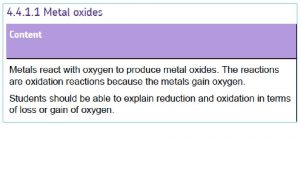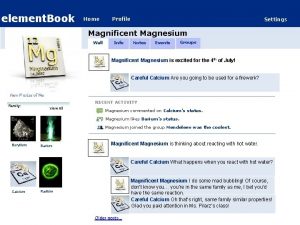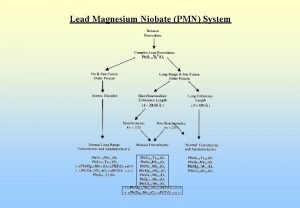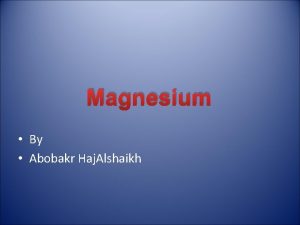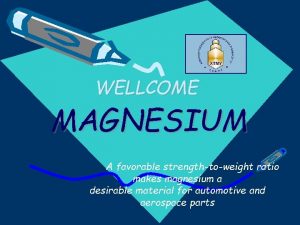Magnificent Magnesium Fun Facts Magnesium is essential for









- Slides: 9

Magnificent Magnesium

Fun Facts • Magnesium is essential for good health. • According to the National Institute of Health, it is the 4 th most abundant mineral in the body. • Half of magnesium is in the bones. • It is needed for more than 300 different reactions in the body!

Where is Magnesium in My Body? • Bones • Cells of Tissues • Organs

What Are the Benefits? ØAides muscle and nerve function ØKeeps the heart rhythm steady ØHelps keep bones strong ØBoosts immune system ØExcess is removed from the body via the kidneys.

What Are Some Sources of Magnesium? Various Nuts Various Beans Various Grain Product Various Dairy Product Spinach and Other Green Vegetables • Potato • Banana • Raisins • • •

Recommended Daily Intake of Magnesium Age Male Female 4 to 8 years 130 mg/day 9 to 13 years 240 mg/day 14 to 18 years 410 mg/day 360 mg/day 19 to 30 years 400 mg/day 31 and older 420 mg/day 320 mg/day

Magnesium and Health • Magnesium helps control blood pressure within normal levels. • Magnesium can help in controlling blood sugar and insulin levels. • Adequate magnesium level may also lower the risk for heart disease. • Having enough magnesium can help increase exercise time. • Adequate magnesium may also keep osteoporosis at bay.

How Do I Know I am Getting Enough? ü Most individuals have adequate magnesium levels. Only those with specified medical conditions may require magnesium supplements.

Authors: Heli Roy, Ph. D, RD Beth Kalicki Division of Education Pennington Biomedical Research Center Mission: To promote healthier lives through research and education in nutrition and preventive medicine. The Pennington Center has several research areas, including: Clinical Obesity Research Experimental Obesity Functional Foods Health and Performance Enhancement Nutrition and Chronic Diseases Nutrition and the Brain Dementia, Alzheimer’s and healthy aging Diet, exercise, weight loss and weight loss maintenance The research fostered in these areas can have a profound impact on healthy living and on the prevention of common chronic diseases, such as heart disease, cancer, diabetes, hypertension and osteoporosis. The Division of Education provides education and information to the scientific community and the public about research findings, training programs and research areas, and coordinates educational events for the public on various health issues. We invite people of all ages and backgrounds to participate in the exciting research studies being conducted at the Pennington Center in Baton Rouge, Louisiana. If you would like to take part, visit the clinical trials web page at www. pbrc. edu or call (225) 763 -3000.










